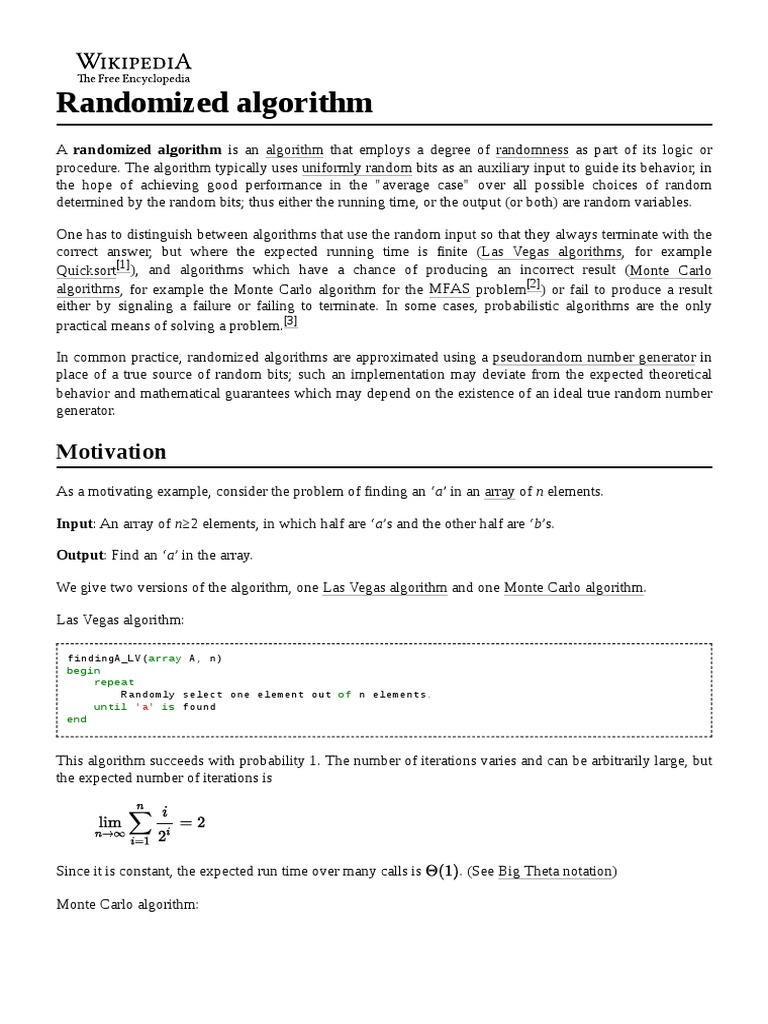Randomized algorithms represent a fascinating convergence of mathematics, computer science, and probabilistic reasoning. These algorithms utilize randomness as an essential component in their logic, distinguishing them from deterministic algorithms, which yield the same output for a given input every time. While deterministic algorithms rely strictly on fixed instructions for problem-solving, randomized algorithms introduce an element of uncertainty that can lead to more efficient or even simpler solutions. This discourse endeavors to unpack the essential characteristics of randomized algorithms, their unique applications, inherent advantages, and noteworthy challenges.
At their core, randomized algorithms are defined by their ability to exhibit different behaviors on different executions, even when provided with the identical set of inputs. This inherent variability can be harnessed to reduce complexity, navigate vast search spaces, and enhance performance metrics. The randomness can be derived from various sources, including pseudo-random number generators, which are algorithms designed to produce sequences of numbers that approximate the properties of random numbers. This quality enables randomized algorithms to explore possibilities that deterministic algorithms might overlook.
One of the most compelling aspects of randomized algorithms is their efficiency. For instance, randomized selection algorithms can often outperform their deterministic counterparts, particularly in selecting the k-th smallest element from a list. The classic Quickselect algorithm, a randomized version of the Quick Sort algorithm, effectively narrows down the search space, achieving an average-case time complexity of O(n) while offering simplicity with an elegant approach. The pivotal realization that blending randomness with systematic methods can yield superior efficiencies beckons a shift in perspective—this is at the crux of what makes randomized algorithms so intriguing.
Moreover, randomized algorithms shine in applications fraught with uncertainty and large datasets. Consider Monte Carlo simulations, a powerful class of algorithms that leverage random sampling to compute results. These simulations have found their niche across diverse fields, including statistical physics, finance, and even artificial intelligence. For instance, in risk assessment models, randomized algorithms can generate a multitude of scenarios to evaluate potential outcomes, thus facilitating decision-making processes under uncertainty.
The probabilistic nature of randomized algorithms also contributes to their robustness. For many problems, crafting a deterministic solution can either be computationally infeasible or overly complex. In contrast, randomized algorithms can often deliver satisfactory solutions efficiently, even though these solutions may not be optimal. This notion brings forth an important concept in computer science: the trade-off between accuracy and computational efficiency—a dance that often dictates algorithm design.
Furthermore, randomized algorithms encompass a plethora of techniques, each with distinct methodologies. One notable category involves randomized rounding. This technique transforms a fractional solution to an integer solution in optimization problems, ensuring that the resultant solution remains close to optimal. Such methodologies are particularly relevant in operations research and logistics, where discrete choices must be made for optimal outcomes. Another method is the use of random walks, which are instrumental in fields like network theory and Markov chain Monte Carlo methods, demonstrating the versatility inherent in randomized algorithms.
Despite their myriad advantages, it is crucial to address the challenges associated with randomized algorithms. One major concern involves the reproducibility of results; the probabilistic outcomes can hinge on the seed value used to generate random numbers. This characteristic can lead to variations in results, necessitating robust methodologies to ensure consistency and reliability in applications where accuracy is paramount. There also exists the potential for algorithms to be adversely affected by poor random number generation, which can undermine the very benefits that randomness is intended to confer. Thus, understanding the stochastic processes involved and ensuring high-quality randomness is essential for harnessing the power of these algorithms effectively.
In the realm of theoretical exploration, randomized algorithms have catalyzed profound insights into complexity classes. The introduction of randomized complexity classes, such as BPP (Bounded-error Probabilistic Polynomial Time), has shifted the landscape of computational theory. These classes challenge traditional assumptions about algorithmic performance and pave the way for new paradigms that intertwine randomness with computation. This evolving landscape speaks to the dynamic nature of computer science, urging scholars to reconsider established boundaries and explore the potential that randomness holds.
In summation, randomized algorithms serve as a testament to the beauty of intertwining probabilistic reasoning with algorithm design. They encapsulate a unique methodology that champions efficiency, flexibility, and robustness while navigating the intricacies of computational challenges. Engaging with these algorithms invites a refreshing perspective on problem-solving and opens avenues to innovative applications across various domains. As the frontiers of computer science continue to expand, the study and application of randomized algorithms will undoubtedly play a pivotal role in shaping future methodologies, advancing both theoretical and practical aspects of this vibrant discipline.












